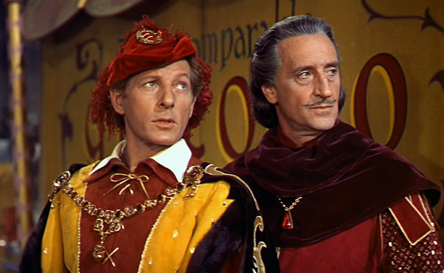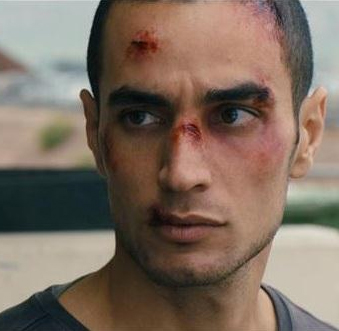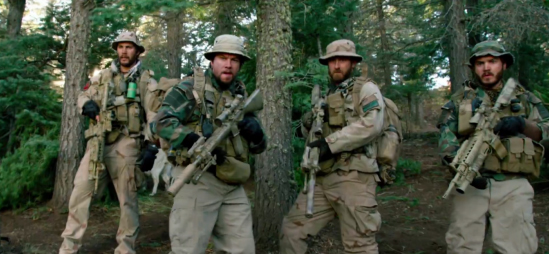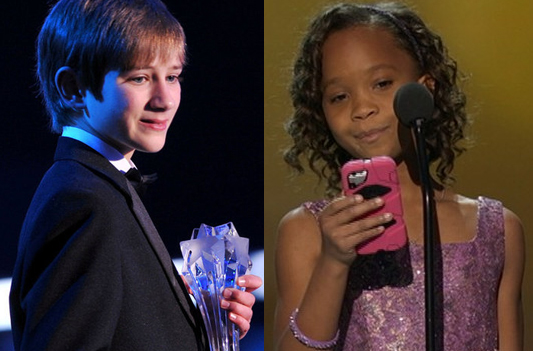Anne Marie concludes her AFI adventures. Nathaniel picks up the baton tomorrow. He's running behind as per usual!
At the midway point of AFI Fest, I experienced what I’m sure many film festival-goers experience at some point: fatigue. The films were Great with a capital G, which meant that while many were truly great films they were also very heavy and in most cases very, very depressing. (Dear Academy, please nominate more comedies!) Nevertheless I persevered, and started Day Four with a little light comedy.
 Get it? Got it! Good
Get it? Got it! Good
Day 4 Part 1: The Court Jester - Sometimes you just need Danny Kaye singing tongue twisters in Technicolor to start your day. If I ever write a list of Greatest Swordfights In Film, Kaye’s comic fight with Basil Rathbone will definitely make the list. And for you Old Hollywood actressexuals, there are not one but TWO actresses: The always lovely Glynis Johns plays Kaye’s love interest, and the devilishly fantastic Angela Lansbury in villainess mode plays the selfish princess.
 Day 4 Part 2: Omar - Let’s get this out of the way right now: Adam Bakri is a very, very handsome man. (He also favorited one of my tweets. Heeeeey Adam!) However, there’s more to life than being really, really ridiculously good-looking. This latest film by Hany Abu-Assad, Palestine's Oscar submission this year, doesn’t court as much controversy as Paradise Now did in 2005. Omar is a Romeo and Juliet love story, an espionage thriller, and a drama, all of which make the political message about Israel’s treatment of Palestinians more palatable. Omar would give any Hollywood thriller a run for its money, but the human story and the realities of life of the West Bank give the film raw power.
Day 4 Part 2: Omar - Let’s get this out of the way right now: Adam Bakri is a very, very handsome man. (He also favorited one of my tweets. Heeeeey Adam!) However, there’s more to life than being really, really ridiculously good-looking. This latest film by Hany Abu-Assad, Palestine's Oscar submission this year, doesn’t court as much controversy as Paradise Now did in 2005. Omar is a Romeo and Juliet love story, an espionage thriller, and a drama, all of which make the political message about Israel’s treatment of Palestinians more palatable. Omar would give any Hollywood thriller a run for its money, but the human story and the realities of life of the West Bank give the film raw power.
Day 5: Nebraska - This was my favorite film of the festival. Hollywood has a love affair with Middle America this year, but Alexander Payne’s new film stands out from the rest. Bruce Dern is best known for his big, showy performances (memorialized at AFI Fest by a typically exuberant introductory speech / clip show by Quentin Tarantino). However, as the reticent Woody Grant, Dern is subtle, sad, and sincere. Undoubtedly Dern will get a Best Actor nomination, but I’m also rooting for June Squibb as his foul-mouthed Catholic wife. Though the overall tone of the film is melancholy (aided by a simple score by Mark Orton and beautiful black and white cinematography by Phedon Papamichael), occasional moments tip towards comedy and almost into parody. Maybe I love it so much because it reminds me of my own family. I’m not sure. I do know that it was effective enough to make me momentarily forget my new home and get nostalgic for the Great Plains instead. That takes some serious filmmaking skill.

Day 6: Lone Survivor - I’m not sure how to comment on Lone Survivor as a film, because as an experience it was really difficult for me to watch. It was, however, an extremely effective war movie. Last year, Zero Dark Thirty gave us a celebration of the incredible skill and commitment the men and women in the American armed forces. This year, Lone Survivor builds a similar memorial to the Navy SEALS, but with a radically different outcome. [Titular Spoiler Ahead] A brutal 33 minute-long gunfight between four SEALS and a Taliban army is the focal point of the film, and all but one SEAL (played by Mark Wahlburg) are killed [/Spoiler]. The goal is to put the viewer on the ground with the SEALS, and director Peter Berg succeeds. Lone Survivor is bloody, loud, and patriotic.
Day 7: Like in Genesis, this was my day of rest. I’d planned to see Her, but happily for Spike Jonze (though unhappily for me) the line for the film wound around the block and then some. As I walked to the train station, I vowed like Nathaniel at TIFF that I will do better next year. The little that I saw I loved, and next year I will know how to plan: more than just one schedule, pack protein bars and water, arrive two hours early for any Spike Jonze-affiliated movie, and find more time to write. All in all though, I had a wonderful time seeing some movies I’d looked forward to and some way outside my comfort zone. What a week! AFI Fest 2014 here I come!
 Monday, November 18, 2013 at 11:30AM
Monday, November 18, 2013 at 11:30AM  Thomas Horn & Quvenzhane Wallis, the last two winners of this category
Thomas Horn & Quvenzhane Wallis, the last two winners of this category








